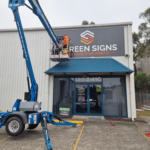When it comes to business signage, it’s not just about design and visibility—regulations play a crucial role in what you can and can’t do. In Newcastle, the local council has established specific rules that all business owners must follow when installing signage. Whether you’re opening a new shop or updating your current branding, it’s essential to understand these guidelines to avoid delays, penalties, or costly removals. That’s where Screen Signs, a trusted signage provider, steps in to help businesses navigate the legal side of things. When installing Newcastle signs, knowing the rules is just as important as knowing the right design.
Here are the most frequently asked questions about signage regulations in Newcastle.
1. Why Do Newcastle Signs Need to Follow Regulations?
Regulations exist to ensure that signage:
-
Maintains public safety
-
Preserves the character of the local environment
-
Avoids visual clutter and distraction
-
Complies with zoning and land use laws
Without proper regulation, signage could become a safety risk, conflict with heritage areas, or negatively impact the aesthetics of the city. Following the rules protects both your business and the community.
2. Do I Need Council Approval for My Sign in Newcastle?
In many cases, yes. Council approval may be required if:
-
The sign is illuminated or oversized
-
It’s located in a heritage-listed building or conservation area
-
You’re placing a sign in a public space or over a footpath
-
The signage is digitally animated or flashing
Even for simpler signage, it’s wise to check with the Newcastle City Council’s Development Control Plan (DCP) or consult a signage expert like Screen Signs to determine if you need formal approval.
3. What Types of Signs Are Covered by Newcastle Regulations?
Newcastle regulations typically apply to:
-
Wall signs
-
Awning and fascia signs
-
Projecting (blade) signs
-
Free-standing pylon or totem signs
-
Window signage
-
Billboards and promotional banners
-
Digital or LED screens
Each type has its own set of criteria for height, size, location, and lighting. Make sure your signage falls within these specific parameters.
4. Are There Special Rules for Signs in Heritage Areas?
Yes. Signage in heritage zones is subject to stricter controls to maintain architectural and historical integrity. Requirements may include:
-
Traditional materials (like timber or brass instead of plastic)
-
Smaller scale and subtle placement
-
Classic fonts and muted color palettes
-
Non-intrusive lighting, if any
It’s strongly recommended to consult professionals experienced in heritage signage to ensure full compliance without compromising on branding.
5. What Happens If I Don’t Follow Signage Regulations?
Non-compliance can result in:
-
Council-issued fines or legal notices
-
Forced removal of the signage
-
Delays in business opening or operations
-
Negative public perception or damage to your reputation
To avoid these issues, always verify your signage plans before fabrication and installation. Companies like Screen Signs can handle the compliance side of your project, so you stay focused on growing your business.
Conclusion
Signage regulations may seem like red tape, but they are in place to ensure that Newcastle remains a safe, beautiful, and well-organized city for both businesses and residents. Before you invest in signs, take the time to understand what’s required—because compliance is just as important as creativity. If you’re unsure where to start, trust Screen Signs to guide you through every step of the process when creating Newcastle signs that are not only effective but fully compliant with local laws.

